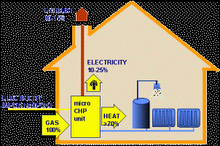The UK Government (BERR) today published the results of an extensive market study into microgeneration. They seem to think the potential is fantastic, 9 million systems installed by 2020, as much power as 5 nuclear power stations and, going on, enough to save 30 million tonnes of CO2 by 2030.
The research was undertaken in support of the commitment in the Climate Change Act last year to establish binding targets if the potential could be demonstrated; now it has. So will Gordon bite the bullet? After all it is not his money and yet another stealth tax will hardly be noticed. Oh, sorry, forgot to mention that this fantastic microgeneration roll-out would be funded by a feed-in tariff like the German one which may deliver products into the market, but is probably one of the most expensive and bureaucratic subsidies ever invented, as popular as the Common Agricultural Policy with proponents and about as unpopular with those who have to pay-the consumer! Supporters point to the impressive growth in PV in Germany, conveniently forgetting that PV is one of the most absurdly over-subsidised technologies ever, with a payment of 40p/kWh (that is four times what you currently pay for conventional power and ten times what micro CHP costs), the subsidy being inversely proportional to the viability of the technology. That is, the less cost-effective the technology, the bigger the subsidy, a perverse incentive to invest in the least effective generation option.
You would assume that this meant PV must have some pretty impressive environmental credentials. You would be wrong. Solar PV (polycrystalline silicon) uses vast amounts of energy to produce, so that it takes around 12 years just to pay for the energy consumed in manufacture and delivers electricity at about 0.25kg/kWh, about half the UK average mix, but higher than fossil fuelled micro CHP at 0.22kg/kWh! So then would you assume that micro CHP gets an even better subsidy? Oh no, it is proposed that micro CHP gets a mere 5p/kWh, one eighth of PV. Now I have often argued that micro CHP does not need subsidy, just a level playing field, so I am not particularly upset about the lower subsidy to micro CHP. The problem is that we have finite resources (yes it is YOUR money that will be collected through higher electricity bills to subsidise the PV industry, but then you probably think the UK taxpayer should be supporting poor start-up companies like...er...BP, Sharp, Kyocera...) and if we are all forced to subsidise PV, with a whole lot more going to nuclear, there will not be much left to invest in sensible technologies.
Parliament voted against feed-in tariffs the other day, so maybe they have seen sense, but then again, Gordon might decide it is just too tempting to get the Greens and the motorists off his back when he knows that a coherent energy taxation strategy is just too difficult to implement.
Microgeneration does have its place and great potential, but we should not be wasting our limited resources on irrelevant technologies. The last thing the microgeneration industry needs is more misguided government intervention which squanders resources, alienates the taxpayer and which will never be enough to keep the PV industry happy anyway.
For further information on various microgeneration technologies, visit the micro CHP website and see the paper on Microgeneration and micro CHP.
Monday, 2 June 2008
Subscribe to:
Comments (Atom)
